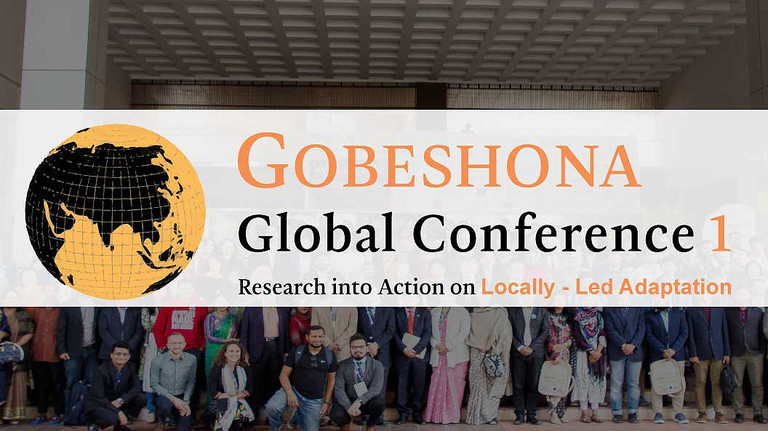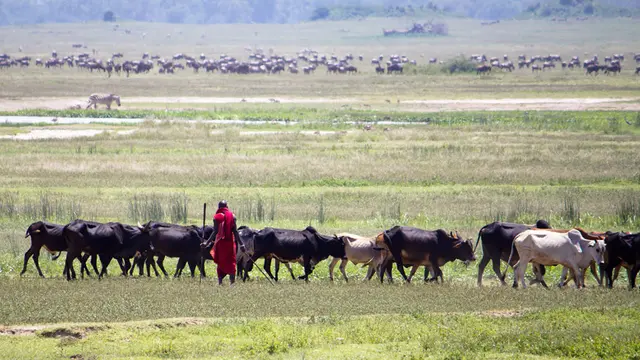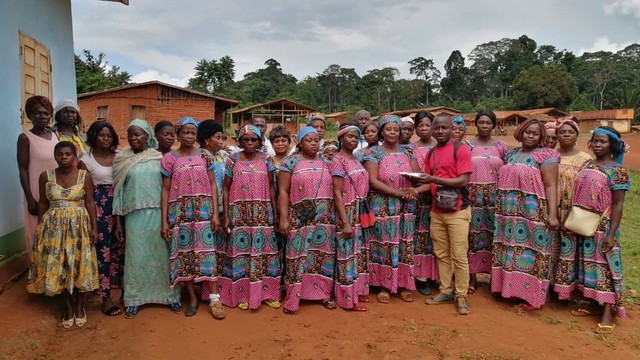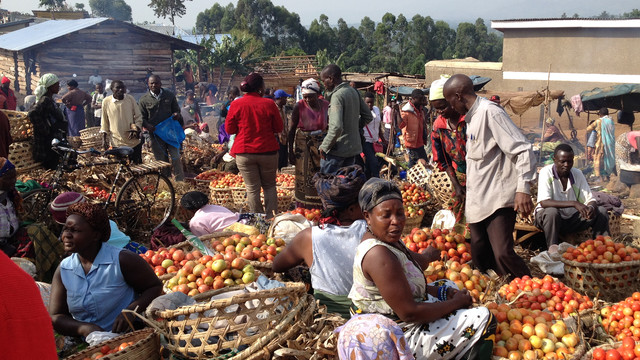Gobeshona Global Conference 1
IIED and partners participated in the Gobeshona Global Conference 1, a week-long digital event from 18-24 January 2021.

This year's online Gobeshona conference was open to interested participants across the world and included a focus on principles for locally led adaptation action (Photo: ICCCAD)
Hosted by the International Centre for Climate Change and Development (ICCCAD), the 1st Gobeshona Global Conference explored a broad range of themes, focusing on locally-led adaptation action across different geographical regions.
The annual conference, which previously took place in Bangladesh, was this year held entirely online and across multiple timezones from 18-24 January 2021. It provided an opportunity to bring together a distinguished and multidisciplinary group of scholars, policymakers, researchers and practitioners from around the world to share their knowledge, research and practical experiences on climate change issues.
IIED and partners hosted and contributed to the following events:
Keynote address and hard-talk session with Anne-Marie Trevelyan, UK International Champion on Adaptation and Resilience
Online event
Date: Monday, 18 January 2021
Organised by: International Centre on Climate Change and Development
This session involved a keynote address and hard-talk qustion-and-answer session with Anne-Marie Trevelyan, UK Minister for Business, Energy and Clean Growth. It explored critical issues including the main sticking points and challenges in the UNFCCC negotiations, what measures need to be taken to ensure climate finance commitments are fulfilled, and how to strengthen transparency of international climate finance.
From measuring resilience to advancing resilience practice
Online event
Date: Monday, 18 January 2021
Organised by: Global Resilience Partnership
This session marked the transition of the Resilience Measurement, Evidence and Learning Community of Practice (RMEL CoP) into the Resilience Knowledge Coalition. IIED was involved in two short panels:
- Advancing resilience measurement in the 2020s offered perspectives from RMEL CoP members on what RMEL has achieved over the past decade, and the opportunities for the next generation of resilience measurement to further support ‘research into action’, and
- Reflections on how research and measurement can shape action offered insights from coalition members on what key decision-makers (communities, cities, local governments, national policymakers, private sector) need and want from resilience measurement to better guide locally-led adaptation.
Disruptive resilience: innovative approaches for responding to the new normal in cities of the global South
Online event
Date: Friday, 22 January 2021
Organised by: IIED
Urban centres across the world are unprepared for the ‘disruptive risks’ they now face. Highly unlikely disturbances are occurring more frequently. Established hazard patterns are shifting. Multiple crises are unfolding concurrently. A disturbance in one part of the globe is felt in another. The compound impacts of COVID-19 and climate change are important examples of disruptive risks that are rendering existing risk-management systems and practices redundant.
New kinds of data, modes of collaboration, financial mechanisms, innovation models and decision-making approaches are needed to ‘disrupt’ existing ways of enhancing urban resilience and meet this challenge effectively. This session employed a ‘systems perspective’ to explore how different institutions engaged in risk management policy, practice, research and finance are experiencing these shifts and the innovative tools that they are deploying to adapt and build resilience.
Related reading: Disruptive resilience: an agenda for the new normal in cities of the global South
Gender responsive climate budgeting in Bangladesh: harnessing lessons for inclusive climate response
Date: Friday, 22 January, 2021
Organised by: Action Aid Bangladesh, in partnership with International Budget Partnership, Heinrich Boll Foundation and IIED
To accelerate progress toward more effective approaches to integrating gender and climate in public financial management, the International Budget Partnership (IBP), IIED and the Heinrich-Böll Stiftung are undertaking exploratory research looking at existing practices and approaches, as well as opportunities and possible core guiding principles for gender-responsive climate change budgeting (GR-CCB).
The research is a first step in testing the hypothesis that GR-CCB is useful in terms of better planning and more effective, efficient and equitable use of public financial resources – and that it leads to stronger outcomes in terms of addressing the causes of climate change, building resilience to and adapting to gender-differentiated climate change risks and impacts, as well as to improving gender equality.
This session analysed GR-CCB issues and opportunities in the cases of Bangladesh and Mexico, two countries that represent very different climate change policy and public financial management contexts and have engaged in gender and climate budgeting at the national level to some extent. Three gender and climate experts reflected on the findings before wider inputs from all participants.
Sharing CBA14’s messages at Gobeshona
Online event
Date: Saturday, 23 January 2021
Organised by: IIED
The 14th International Conference on Community-based Adaptation to Climate Change (CBA14) brought together climate adaptation practitioners from around the world to share experiences and learning from implementing adaptation projects and programmes on the frontline of climate change. Many of the attendees were local practitioners, working at grassroots or community level on a daily basis.
CBA14 featured sessions under five themes: climate finance, adaptation technology, nature-based solutions, responsive policy and youth inclusion. These sessions produced a set of messages that are directly relevant to the case for locally-led action. The messages identify priorities for NGOs, countries, donors and climate funds, while picking out effective ways of doing adaptation that dovetail with the principles for locally-led action.
CBA and Gobeshona form part of a like-minded community of practice of practitioners and researchers driving forward the case for adaptation that takes place at local level. To get the most out of these messages, and so that we challenge ourselves to build on our learning and innovate, this plenary session asked Gobeshona participants to reflect on the messages, challenge them, pick out relevant evidence and share examples of positive practice. The aim was for the CBA messages to take another step forward during the session, bolstered by the review of a similar, but more research-focused community. The messages from this session went on to inform the planning and design of CBA15.
Related reading: Knowledge and experiences from the 14th International Conference on Community-Based Adaptation to Climate Change
Principles for locally led adaptation: a call to action
Online event
Date: Saturday, 23 January 2021
Organised by: World Resources Institute (WRI) and IIED
The impacts of climate change are felt most acutely by vulnerable communities at the local level. Despite this, they lack the agency to reduce risk and build resilience as the design, delivery and financing of adaptation actions is led by actors at higher levels.
To rectify this, in its 2019 flagship report, the Global Commission on Adaptation (GCA) called for the decentralisation of adaptation finance to the local level. In 2020, the GCA and IIED led a process to collaboratively develop ‘principles for locally led adaptation’ with a large number of partners that included donors, civil society organisations, community groups, social movements, bilateral and multilateral institutions.
These principles serve as foundational guidance for enabling ‘locally led action’ for adaptation where local actors have the agency to design and deliver adaptation solutions. They include an emphasis on devolving decision making, addressing structural inequalities and providing patient and predictable funding. They also highlight the need for emphasising both local and scientific knowledge, ensuring learning and adaptive management, enhancing transparency and improving collaboration for the delivery of effective adaptation solutions.
As the world moves towards COP26 and beyond, GCA and IIED through the locally-led adaptation action track are mobilising commitments that align with these principles. The commission invites organisations working on reducing climate risk to endorse these and join a community of practice on a journey of 'learning-by-doing' to strengthen locally-led action on adaptation.
This session entailed an exploration of the principles and discussion with endorsing organisations. It focused on the manner in which these principles are leading to organisations to shift away from ‘business as usual’ to ‘business unusual’ and empowering local actors to determine adaptation solutions. As such, it acted as a clarion call for salient adaptation actors to align with this transformational agenda.
Related reading: Raising ambition in locally led action for 2021: calling for business unusual
Closing plenary
Online event
Date: Sunday, 24 January 2021
Organised by: International Centre for Climate Change and Development
Speakers included: Andrew Norton, IIED director
The Gobeshona closing event reflected on the key messages from across the week-long conference.
IIED's research featured in a number of events throughout the conference. For example, IIED contributed to a briefing paper based on analysis of 'Voices from the Frontline', a collaboration between the Global Resilience Partnership, ICCCAD, Durham University, Makarere University and IIED funded by the Climate and Development Knowledge Network. The analysis looks at the relationship between COVID-19, climate change and the importance of locally-led action (PDF).
- All the events at Gobeshona Global Conference 1 London Climate Action Week can be found on the Gobeshona website.


